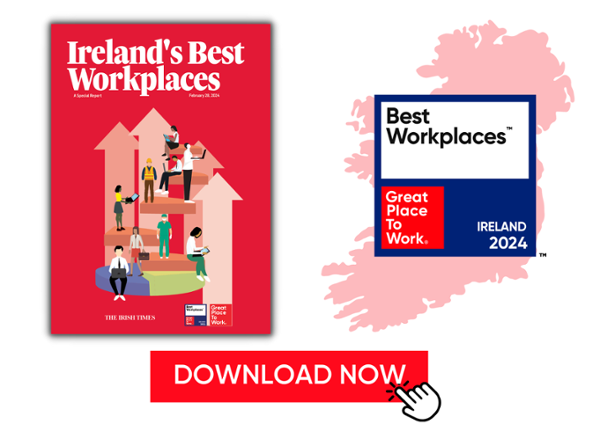Providing learning and development opportunities for employees is one key initiative that can boost your company culture from good to Great. Among Ireland's Best Workplaces 2024, 84% of employees agree that they are developing professionally working at their organisation, in stark contrast to just 59% of employees agreeing with this at organisations not Certified by Great Place To Work. This gap showcases the clear need for businesses to prioritise employee growth in order to maintain a satisfied workforce who feel they are valued by their organisation. To summarise the significance of these initiatives, we've broken this down into 4 key aspects.
Increased employee engagement
When organisations invest in employees' professional growth, it communicates that they are valued members of the team. This recognition fosters a sense of worth and appreciation, leading employees to feel more committed to their work. This directly links in with increased job satisfaction; employees who feel supported in their professional development are generally more satisfied with their jobs. Learning new skills or taking on challenging projects can add variety and excitement to their roles, further contributing to overall job satisfaction.
As learning and development opportunities provide employees with the chance to advance their skills and knowledge, this of course supports their career progression within the organisation. It also empowers employees to take ownership of their professional growth, and again, when individuals have the autonomy to pursue learning that aligns with their interests and career goals, they are more engaged and motivated to succeed.
Talent attraction and retention
Learning and development opportunities are crucial for talent retention. They demonstrate an organisation's commitment to the growth and advancement of its employees - when employees feel that they have opportunities to develop new skills, advance their careers, and reach their full potential within the company, they are more likely to stay motivated and engaged. Additionally, offering learning and development opportunities can increase employees' sense of loyalty to the organisation, as they feel valued and invested in. This, in turn, helps to reduce turnover rates and retain top talent within the organisation.
At leisure centre company Aura Holohan Group, their culture aims to empower everyone in the business. They have achieved this through their focus on their Aspire programme and by continuing to support and encourage their people to grow and develop in the business. As part of the Aspire programme, staff development is a top priority; after all, Aura themselves say that their success is based largely on the contribution, commitment and achievements of their people. It is for this reason that they support their people in the performance of their designated roles and help them to fulfil their potential during their employment by learning new skills and progressing their careers. It's vital for organisations to recognise the key role of its people in order to thrive.
When looking at talent attraction, in today's competitive job market, organisations that offer robust learning and development programs stand out as the best places to work. Potential candidates are drawn to companies that prioritise employee growth and offer opportunities for continuous learning.
Enhanced employee skills and performance
Learning and development programs equip employees with new skills, knowledge, and competencies, enabling them to perform their roles more effectively and efficiently. One way of doing this that is increasing in popularity in recent years is through mentorship programs. Mentors possess valuable experience, expertise, and industry insights that they can impart to mentees. This knowledge transfer accelerates the mentee's learning curve and helps them avoid common pitfalls. Mentorship is ranked the first focus area for Learning and Development programs in 2023 in the LinkedIn Learning Report (1). This relationship allows for personalised learning experiences tailored to the mentee's needs and learning style. This focused approach can lead to faster growth and skill acquisition.
A great example of mentorship can be seen at cloud-based restaurant management software company Toast, who offer a mentorship program specifically for women in the organisation, hosted by ToastHer, their Employee Resource Group for women. Through their mentorship program, members have the opportunity to learn from female leaders throughout the business;
“I've been both mentor and mentee. It doesn't matter what level you are, we encourage people to have multiple mentors and mentees across the organisation. I've learned a lot from mentoring people, it goes both ways."
Cara Kelly, Associate Director, Program Management, Toast

Increased transparency and open communication
One huge benefit of providing these initiatives for staff is how it can create platforms for open communication and transparency within the organisation. Participation in learning and development initiatives often involves group activities, workshops, or training sessions where employees interact and collaborate. These shared learning experiences create opportunities for employees to engage in open communication, share ideas, and exchange feedback.
Learning and development programs also help to align employees' personal development goals with the organisation's objectives. When employees understand how their learning contributes to the company's success, they are more likely to engage in transparent communication about their progress, challenges, and aspirations.
In a general sense, when organisations invest in employees' learning and development, it sends a message that they care about their growth and wellbeing. This fosters trust between employees and management, making employees feel more comfortable engaging in open and transparent communication about their needs, concerns, and ideas.

More resources:
About Great Place to Work®
Great Place to Work® is the global authority on workplace culture. We help organisations quantify their culture and produce better business results by creating a high-trust work experience for all employees. We recognise Great Place to Work-Certified™ companies and the Best Workplaces™ in more than 60 countries.
To join the thousands of companies that have committed to building high-trust company cultures that help them attract, retain and take care of their people, click below to contact us about getting Certified™ today.

Sources
(1) LinkedIn Learning Report https://learning.linkedin.com/content/dam/me/learning/en-us/pdfs/workplace-learning-report/LinkedIn-Learning_Workplace-Learning-Report-2023-EN.pdf
